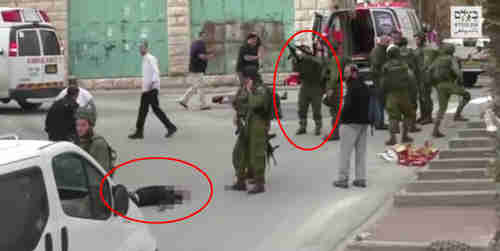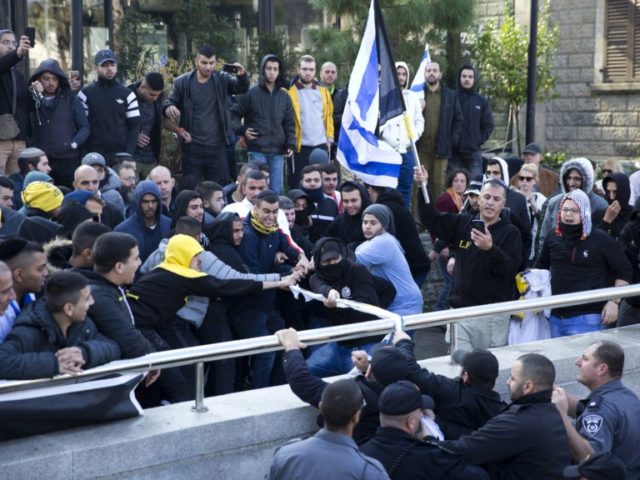This morning’s key headlines from GenerationalDynamics.com
- Israel polarized over conviction of soldier for manslaughter
- Protesters clash with police to protest the verdict
- Comparison to Pakistan murder of Salman Taseer
Israel polarized over conviction of soldier for manslaughter

Screen grab from video of March 4, 2016. Israeli soldier reloads his gun just before shooting dead the Palestinian lying wounded and bleeding (AP)
Israelis appeared to be deeply polarized in reaction to a verdict handed down by a military court on Wednesday convicting an Israeli soldier, Elor Azaria, of manslaughter, for having shot and killed a Palestinian who was lying on the ground wounded.
On March 24 of last year Abdel Fattah al-Sharif and Ramzi Qasrawi Tamimi, two 21-year-old Palestinians, stabbed an Israeli soldier in Hebron, a majority Palestinian city in the West Bank. Tamimi was shot and killed immediately.
Al-Sharif was also shot. The shot did not kill him, but left him wounded and bleeding, lying on the ground. Almost 15 minutes later, one of the soldiers, Elor Azaria, shot al-Sharif in the head, killing him. The entire situation was videoed, and the video was posted on the internet and went viral.
In Wednesday’s court hearing before three military judges in the Israeli Defense Forces (IDF). The lead judge, IDF Col. Maya Heller, spent almost three hours reading the decision that concluded with a conviction on a charge of manslaughter. Azaria had claimed in his defense that he felt he was in danger because al-Sharif might be wearing a concealed explosive vest. The judges rejected that claim, and pointed to the testimony of Azaria’s friend, who testified that Azaria originally said Sharif needed to be killed out of revenge for stabbing a fellow soldier. 24-Mar-2016 and Jerusalem Post
Related Articles
Protesters clash with police to protest the verdict
Some 400 protesters clashed with police to protest the guilty verdict. One protester wore a shirt saying, “The people of Israel don’t abandon a soldier during battle.” Others referred to him as a hero.
A number of protesters threatened violence by chanting, “Gadi, Gadi beware, Rabin’s looking for a friend.” The protesters were threatening to assassinate IDF Chief of Staff Gadi Eisenkot. Yitzhak Rabin was prime minister of Israel until November 4, 1995, when he was shot dead by an Israeli nationalist who opposed Rabin’s support of a peace treaty with the Palestinians.
Palestinian journalist Ali Abunimah said that Palestinians don’t expect anything to change as a result of the verdict:
[The verdict is] divisive in Israel because there is a widespread view that Israeli soldiers should be able to kill Palestinians with complete impunity…
Thousands of Palestinians have been killed in the past 15 years by the Israeli army and there has been no accountability. I think, if you ask practically any Palestinian, they will tell you that even though there was a guilty verdict in this case, in all likelihood he will receive a very light sentence.
The sentence will be handed down on January 15. The maximum sentence that Azaria could receive for manslaughter is 20 years. However, because of the circumstances – al-Sharif had just stabbed an Israeli soldier before being shot – it is expected that the sentence will be considerably lighter than 20 years. Prime minister Benjamin Netanyahu has asked the military to grant Azaria a pardon. Ynet and Radio France Internationale
Comparison to Pakistan murder of Salman Taseer
As we described yesterday, Mumtaz Qadri was showered with roses and treated as a hero in 2011 after brutally murdering Salman Taseer, the governor of Pakistan’s Punjab province.
Elor Azaria was also treated as a hero after murdering a wounded Palestinian who lay bleeding.
The circumstances are different in that the Palestinian had just stabbed another soldier. But what both cases have in common is that they both show how polarized societies around the world have become in this generational Crisis era.
As I’ve been saying for several years, nationalism, xenophobia and racism have been growing in countries around the world. Those who suffered the horrors of World War II and survived realized that nationalism, xenophobia and racism had been the core reasons for the war, and vowed to make sure that they were permanently extinguished. But now, with the survivors of WW II almost gone, and young generations having grown up after WWII not understanding the dangers, nationalism, xenophobia and racism are returning and are a strong as ever. Generational Dynamics predicts that the world is headed for a new world war, the worst war in world history, and the rise of nationalism, xenophobia and racism is one of the reasons that war occur. Vice News
Related Articles
KEYS: Generational Dynamics, Israel, West Bank, Hebron, Elor Azaria, Abdel Fattah al-Sharif, Ramzi Qasrawi Tamimi, Maya Heller, Gadi Eisenkot, Yitzhak Rabin, Ali Abunimah, Pakistan, Salman Taseer, Mumtaz Qadri
Permanent web link to this article
Receive daily World View columns by e-mail

COMMENTS
Please let us know if you're having issues with commenting.